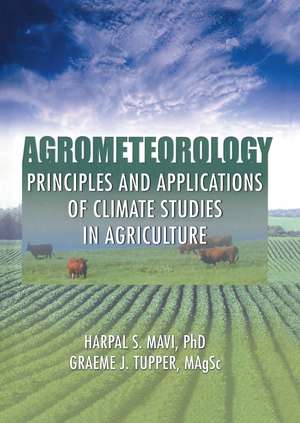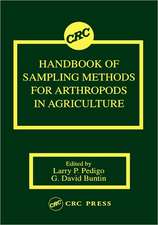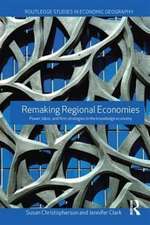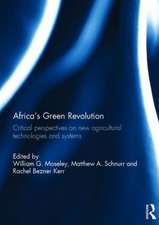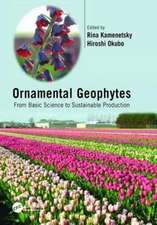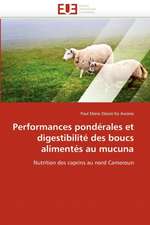Agrometeorology: Principles and Applications of Climate Studies in Agriculture
Autor Harpal S. Mavi, Graeme J. Tupperen Limba Engleză Hardback – 14 apr 2004
Agrometeorology: Principles and Applications of Climate Studies in Agriculture is a much-needed reference resource on the practice of merging the science of meteorology with the service of agriculture. Written in a concise, straightforward style, the book presents examples of clinical applications (methods, techniques, models, and services) in varying climates and agricultural systems, documenting up-to-date research literature from around the world. Its systematic approach—different from most books on the subject—makes it an essential tool for teaching, planning, and practical use by working farmers, as it examines topics such as solar radiation, effective rain, drought monitoring, evapotranspiration, and remote sensing.
Agrometeorology: Principles and Applications of Climate Studies in Agriculture examines the developing discipline that international agencies such as the World Meteorological Organization (WMO) and the Food and Agriculture Organization (FAO) have declared to be an important growth area in university education. A panel of academics, researchers, and practitioners explore the role of agrometeorology in optimum crop growth, from the interactions between meteorological and hydrological factors and agriculture, including horticulture, animal husbandry, and forestry. The book addresses pressing topics of agriculture resource utilization and management, such as regional and land use planning; soil and water conservation; frost; growing degree day; risk analysis of climate hazards; animal parasites; harvest forecasts; crop models; decision support systems (DSS); agroclimatological forecast; and the ecological and economic implications of climate change.
Agrometeorology: Principles and Applications of Climate Studies in Agriculture also addresses:
- managing farm water resources
- environmental temperature
- planning for frost mitigation
- photosynthetically active radiation (PAR)
- thermoperiodism
- managing the extremes—droughts and floods
- using computers to manage agricultural systems
- and much more!
Preț: 765.47 lei
Preț vechi: 841.18 lei
-9% Nou
Puncte Express: 1148
Preț estimativ în valută:
146.48€ • 156.63$ • 122.13£
146.48€ • 156.63$ • 122.13£
Carte disponibilă
Livrare economică 27 martie-10 aprilie
Livrare express 13-19 martie pentru 37.74 lei
Preluare comenzi: 021 569.72.76
Specificații
ISBN-13: 9781560229728
ISBN-10: 1560229721
Pagini: 376
Dimensiuni: 157 x 216 x 26 mm
Greutate: 0.66 kg
Ediția:1
Editura: CRC Press
Colecția CRC Press
ISBN-10: 1560229721
Pagini: 376
Dimensiuni: 157 x 216 x 26 mm
Greutate: 0.66 kg
Ediția:1
Editura: CRC Press
Colecția CRC Press
Public țintă
ProfessionalNotă biografică
Harpal S. Mavi, Graeme J. Tupper
Cuprins
Preface,, Acknowledgments,, Chapter 1. Agrometeorology: Perspectives and Applications,, Definition,, A Holistic Science,, Scope,, Practical Utility,, Chronology of Developments,, Future Needs,, Chapter 2. Solar Radiation and Its Role in Plant Growth,, The Sun: The Source of Energy,, Nature and Laws of Radiation,, Earth’s Annual Global Mean Radiative Energy Budget,, Solar Radiation and Crop Plants,, Solar Radiation Interception by Plants,, Photosynthetically Active Radiation (PAR),, Solar Radiation Use Efficiency,, Chapter 3. Environmental Temperature and Crop Production,, Soil Temperature,, Air Temperature,, Plant Injury Due to Sudden Changes in Temperature,, Frost: Damage and Control,, Thermoperiodism,, Temperature As a Measure of Plant Growth and Development,, Chapter 4. Climatological Methods for Managing Farm Water Resources,, Water for Crop Production,, Making Effective Use of Rainfall,, Evaporation and Evapotranspiration,, Water Use and Loss in Irrigation,, Climatological Information in Improving Water-Use Efficiency (WUE),, Reducing Water Losses from Reservoirs,, Chapter 5. Drought Monitoring and Planning for Mitigation,, Definition of Drought,, Meteorological Indicators of Drought,, Drought Monitoring in Australia,, Drought Exceptional Circumstances,, Overview of Drought Assessment Methods,, Meeting the Challenge: A Drought Mitigation Plan,, Desertification,, Chapter 6. Climate, Crop Pests, and Parasites of Animals,, Role of Weather
Descriere
Agrometeorology: Principles and Applications of Climate Studies in Agriculture is a much-needed reference resource on the practice of merging the science of meteorology with the service of agriculture. Written in a concise, straightforward style, the book presents examples of clinical applications
